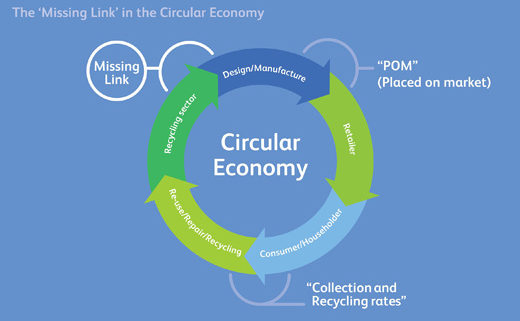Closing the missing link in the circular economy
The EU paper on the action plan for a circular economy starts with the statement that the transition to a more circular economy is an essential contribution to the EU’s efforts to develop a sustainable, low carbon, resource efficient and competitive economy. The intrinsic value of materials and resources should be kept in the economy for as long as possible and to reach this goal the generation of waste should be minimized.
MBA Polymers has been working on creating a circular economy by recycling plastics from e-waste and End-of-Life Vehicles for many years and identified one missing link in the Circular Economy for recycled plastics from these durable products. Richard McCombs – CEO of MBA Polymers: “It is not easy to manage an innovative recycling company like ours if legislation continues to set ever new and tougher threshold values for especially legacy substances. I sincerely hope and expect that this EU initiative for a Circular Economy will not only allow our investments to finally pay off, but also to motivate our shareholders to increase their willingness to invest in this industry that without any doubt offers the society at large huge environmental benefits”.
The return and recycling of the e-waste plastics is taking place. The total recycling of these plastics in Europe however is very limited, despite the hugely positive environmental benefits of keeping these high tech plastics in use. The use of recycled plastics from e-waste for instance requires a different approach to designing products that not only allow for a better recovery of the material, but also allowing the use of Post-Consumer Recycled content. This area will require the designers and recyclers to communicate – the missing link in the current circular economy.
This is particularly important for electrical and electronic products, where a better design can make products not only more durable or easier to recycle, it can also help recyclers to better recover valuable materials and components. Overall, it can help to save precious resources and prevent huge amounts of carbon emissions.
MBA Polymers is more than pleased with the EU objectives with the Circular Economy package in view of actively addressing aspects in future product design related to recyclability and re-application of Post-Consumer Recycled plastics. The plans include comprehensive commitments on eco-design, the development of strategic approaches on plastics and chemicals. This is one major initiative under the umbrella of the EU’s Horizon 2020 research program and it targets actions in areas such as plastics.
With the Circular Economy Package a debate should also be opened around how the environmental benefits of the use of Post-Consumer Recycled plastics can be incentivized by measures such as green public procurement measures or the introduction of financial incentives and rewards for the use of PCR plastics or similar materials.
The proposed actions of the Circular Economy package include exactly the right initiatives to address fundamental issues such as discussions between designers and recyclers to define specifications of Post-Consumer Recycled plastics, re-defining realistic thresholds for legacy substances that do not hamper the recycling industry, the reduction of illegal exports to make these valuable materials available to the efficient recyclers or to take measures to facilitate cross border movement of wastes for good recycling. The current regulatory framework tends to slow down investments, as it creates many uncertainties; the right regulatory framework that is intended by the Circular Economy package will stimulate investments in recycling capacities and improved recycling technologies.
MBA Polymers is eager to participate in these programs, as these will finally eliminate the Circular Economy’s missing link and stimulate the recycling industry.
Article by DI Chris Slijkhuis, E-Waste Recycling – Müller-Guttenbrunn Group

